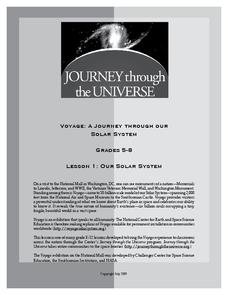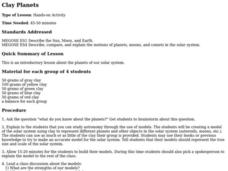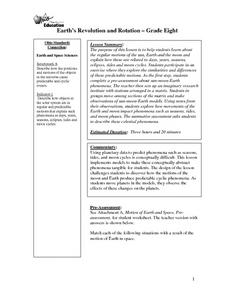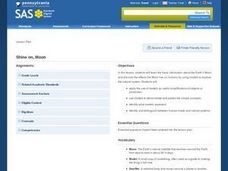Curated OER
The Solar System
For this science worksheet, students learn the names of the 9 planets in our solar system (Pluto is still included here) and locate them in a word search. Students answer 9 questions about the planets--their positions and attributes.
Curated OER
Flying Through the Solar System
Young scholars create a model of the solar system out of candy. They write a book about their travels through the Solar System, beginning at age ten and reaching Pluto at age seventy.
Curated OER
Solar System: Let's Take a Trip
Third graders consider outer space. For this introductory solar system lesson, 3rd graders complete a KWL chart and listen to the story The Magic School Bus: Lost in the Solar System, by Joanna Cole & Bruce Degen. They will...
Curated OER
Where Is Saturn in the Solar System? Where Am I in the Solar System?
Young scholars engage in a solar system activity, In this activity, students will read aloud as a class about the solar system. The young scholars will then listen to the teacher read a solar system book prior to filling out a...
Curated OER
Our Solar System
Learners explore the solar system on the internet and video programs. They investigate the names of each planet and their places in the solar system. They chose their favorite planet and design an advertisement to sell a vacation to...
Curated OER
Hopping Across the Solar System
Students role-play and communicate that objects in space have describable properties, locations, and movements. Students identify and communicate effectively that Earth is the third planet from the Sun in the solar system, eight other...
Curated OER
What's "In" There: A Study of the Inner Planets - Mercury, Venus, Earth, and Mars
First graders identify and explore the four inner planets. In this planet science lesson, 1st graders watch a PowerPoint about the planets. Students read the book Our Solar System and discuss the inner planets. Students create a book...
Curated OER
Beyond The Earth Part I
Students explore the solar system. In this space science lesson, students take notes on the solar system provided by their instructors. Students then collaborate to design a computer-generated drawing of the solar system.
Curated OER
Solar System
In this space science worksheet, students complete each statement with the correct word or phrase related to the solar system. Then they locate each of the planets in a word search that follows.
Curated OER
A Journey Through Our Solar System
Students investigate the concept of the solar system in our universe by constructing a model that is made to a measurable scale. Once the model is constructed it should be placed in a wide open space for observation and demonstration...
Curated OER
Clay Planets
Have your class learn about the solar system using this hands on technique. Learners review what they know about the planets, and create a clay model of the solar system. There are a list of resource links to make this lesson a complete...
T. Smith Publishing
Earth
Young astronomers read an informational text passage and then answer questions based on what they read.
PBS
Why Isn't There an Eclipse Every Month?
Searching for an eclipse activity that sends scholars over the moon? Try an interesting interactive to get their minds active! The resource, part of an extensive Space series from PBS Learning Media, uses modeling and data analysis to...
Simply Worksheets
Solar System - Identifying Planets
In this space science worksheet, learners read the five descriptions of various planets and match the description with the picture of the planet.
Curated OER
Exploration of the Moon
For this moon worksheet, students review the Clementine exploration of the Earth's moon. This worksheet has 8 matching and 14 true or false questions.
Curated OER
Sunny Symbols
After listening to a series of stories about signs and symbols associated with the United States, pupils discuss the importance of the sun in Native American legends and as a representation of New Mexico. As part of this exploration,...
Curated OER
Astronomy Test
In this astronomy test, students answer 50 true/false and multiple choice questions about the relationships of the earth, moon, and sun. The test also includes questions about the solar system, galaxies, and the universe. An answer key...
Curated OER
Earth's Revolution and Rotation
Eighth graders investigate the regular motions of the sun, Earth and the moon and explain how these are related to days, years, seasons, eclipses, tides and moon cycles. They participate in an exercise where they explore the...
Curated OER
Spinning into Space
Students, through hands-on activities, teacher demonstrations, pictures, and informational books, complete a unit on the Earth and its place in the Universe. They make mobiles of the Milky Way and watch demonstrations of lunar and solar...
Curated OER
World In Motion Curriculum
Students explore the night sky and its solar system. Using a Digitarium planetarium system, students observe four constellations. They discover the phases of the moon and eclipses. Students recognize the difference between normal and...
Curated OER
Space: Stars and Planets
Pupils observe and report that the moon can be seen sometimes at night and sometimes during the day. They describe how changes to a model can help predict how the real thing can be altered. Students explain the essential fact of the...
Curated OER
The Starry Night Time and Day Time
Second graders complete a unit of lessons on the solar system. They complete various art projects inspired by Van Gogh's 'Starry Night,' create a moon phases book, create a moon phase wind chime, develop a timeline of space exploration,...
Curated OER
Shine On, Moon
Students explore space science by conducting an experiment in class. In this Moon instructional activity, students define a list of space science vocabulary and read the book The Moon. Students utilize shoeboxes and string to conduct a...
Curated OER
Our Solar System
Young scholars analyze the theories of the formation of the universe and solar system. Students analyze planetary motion and the physical laws that explain that motion: Rotation, Revolution, Apparent diurnal motions of the stars, sun,...























